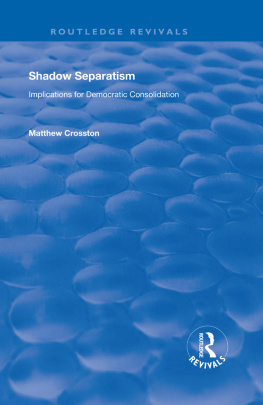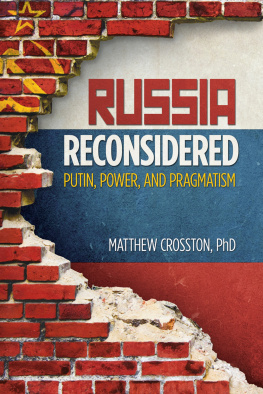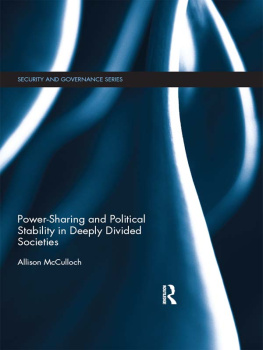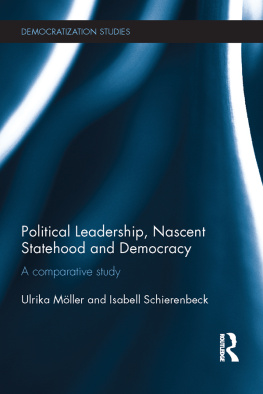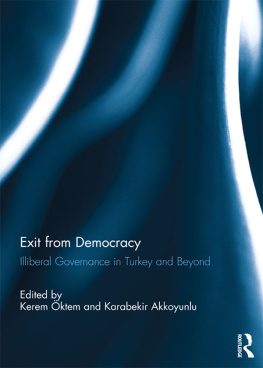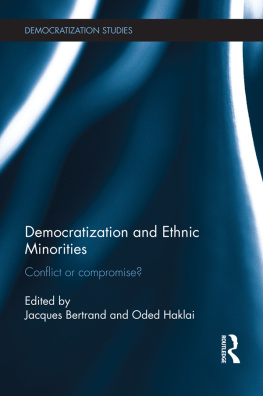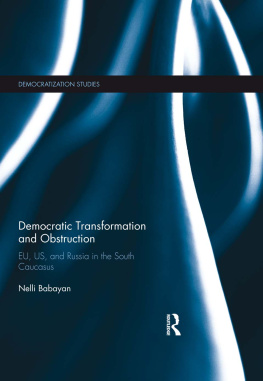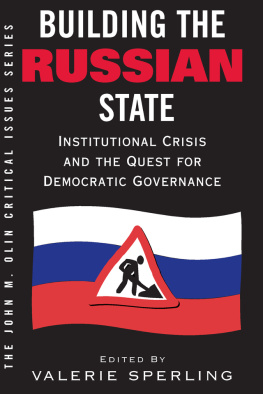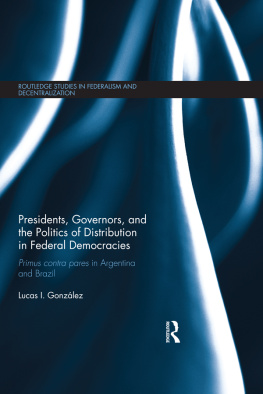SHADOW SEPARATISM
Post-Soviet Politics
Series Editor: Neil Robinson, University of Limerick, Ireland
The last decade has seen rapid and fundamental change in the countries of the former Soviet Union. Although there has been considerable academic comment on these changes over the years, detailed empirical and theoretical research on the transformation of the post-Soviet space is only just beginning to appear as new paradigms are developed to explain change.
Post-Soviet Politics is a new series focusing on the politics of change in the states of the former USSR. The series publishes original work that blends theoretical development with empirical research on post-Soviet politics. The series includes work that progresses comparative analysis of post-Soviet politics, as well as case study research on political change in individual post-Soviet states. The series features original research monographs, thematically strong edited collections and specialized texts.
Uniquely, this series brings together the complete spectrum of work on post-Soviet politics, providing a voice for academics world wide.
Also in the series
The Central Government of Russia:
From Gorbachev to Putin
Iulia Shevchenko
ISBN 0 7546 3982 7
Shadow Separatism
Implications for Democratic Consolidation
MATTHEW CROSSTON
Clemson University, USA
First published 2004 by Ashgate Publishing
Reissued 2019 by Routledge
2 Park Square, Milton Park, Abingdon, Oxon, OX14 4RN
52 Vanderbilt Avenue, New York, NY 10017
Routledge is an imprint of the Taylor & Francis Group, an informa business
Copyright 2004, Matthew Crosston
Matthew Crosston has asserted his right under the Copyright, Designs and Patents Act, 1988, to be identified as the author of this work.
All rights reserved. No part of this book may be reprinted or reproduced or utilised in any form or by any electronic, mechanical, or other means, now known or hereafter invented, including photocopying and recording, or in any information storage or retrieval system, without permission in writing from the publishers.
Notice:
Product or corporate names may be trademarks or registered trademarks, and are used only for identification and explanation without intent to infringe.
Publishers Note
The publisher has gone to great lengths to ensure the quality of this reprint but points out that some imperfections in the original copies may be apparent.
Disclaimer
The publisher has made every effort to trace copyright holders and welcomes correspondence from those they have been unable to contact.
A Library of Congress record exists under LC control number:
ISBN 13: 978-0-8153-9700-7 (hbk)
ISBN 13: 978-1-351-14932-7 (ebk)
Contents
Every journey should have a meaningful beginning, middle and end. The journey to create this book, indeed, my career is no different.
I dedicate this book to:
Jim Macedo, Donna Petrangelo and Donna Whiting for my beginning; Richard Sylvester, Alice Nakhimovsky and Nancy Ries for my middle; Linda Cook, Dominique Arel and Jeff Anderson for my end.
My appreciation can never be adequately expressed.
The first elected President in the history of Russia, Boris Yeltsin, considered a positive center-periphery relationship so essential to democratic transition that he endorsed the controversial design of asymmetrical federalism: Russia would maintain the ethno-territorial divisions of the old Soviet Union while the center would negotiate bilateral autonomy treaties with individual regions. Despite concerns such a design had significant intrinsic flaws, the center hoped the treaties would meet the diverse range of regional preferences and needs, create local capability to solve local problems and form a more cooperative federal-regional partnership upon which to build democratic federalism. Though Russia already had a Federal Constitution and a Federation Treaty outlining in large degree center-periphery rights and obligations, the two documents were not in complete harmony with one another nor did they in total answer all regional concerns. As such, bilateral autonomy agreements came to be considered a pragmatic compromise: they would answer diverse regional problems more specifically while solidifying regional commitment to the transition process more generally.
This project evaluates bilateralism at the federal, regional and local levels. It explicitly examines the political impact of centrism vs. regionalism on transitional regimes. And it does this while engaging a larger theoretical debate on the merits and flaws of centralized vs. decentralized federations as consolidators of democracy. The bilateral autonomy treaty is analyzed as an institutional tool and a basic question is considered: how did regions in Russia use bilateral autonomy treaties and how did that use impact the stability, legitimacy and efficacy of the state? In other words, did their use consolidate or damage federal democratic transition in Russia?
I argue that the use of bilateral autonomy treaties, though meant to alleviate regional concern and push the state down an irretrievably federal democratic path, instead created a hyper-peripheralized federation that undermined Russias chances for long-term democratic stability. Based on this chief hypothesis a second subsequently emerges: ethnic difference and economic potential, two factors more often accepted as causes of center-periphery conflict within democratic transitions, may in fact play a less direct causal role. These two factors, when it comes to democratic transition and consolidating democracy, may in fact be better understood when they are enveloped within or facilitated by institutional mechanisms like bilateral autonomy treaties.
The Empirical Significance of an Institutional Approach
There are several reasons why it is important to analyze the use and impact of these treaties and why the world community should still be concerned by the progress or regress of Russian democratic consolidation. First, Russias structural characteristics before democratization can be considered fairly emblematic of most modern transitioning countries. These conditions include:
The lack of democratic institutions;
The absence of democratic experience historically;
General naivet/ignorance about democratic principles;
A severely weak economic foundation;
The need to profoundly reform the judicial system.
This structural similarity with other potential democratizing states make the consequences clear: Russian successes should be copied while Russian failures provide crucial warnings of strategies to avoid.
Second, Russia remains the holder of the second largest nuclear stockpile and arguably the largest stockpile of biochemical agents in the world. In the post 9/11 world, maintaining these stockpiles under a stable democratic government becomes a national security interest for all countries.
Third, Russia still has significant diplomatic weight on the world stage, especially in its relations with Arab and Asian states long considered anti-western and anti-democratic.
Fourth, Russias inability to consolidate democracy could and arguably already has had a regrettable destabilizing effect on its two nearest spheres of political influence: the Caucasus and Central Asia.

